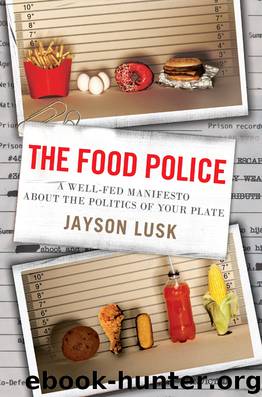The Food Police by Jayson Lusk

Author:Jayson Lusk [Lusk, Jayson]
Language: eng
Format: epub
ISBN: 978-0-307-98704-4
Publisher: Crown Publishing Group
Published: 2013-04-15T16:00:00+00:00
The fact that the food police can’t quite figure out the real effects of farm subsidies hasn’t in the least hindered their desire to remake farm policy. The food elite, not understanding the present, believe they have a crystal ball into the future.
At the forefront of the policy agenda of the food elite is a desire not to cut farm subsidies but to expand and reallocate them toward their favored foods. Writing in the New York Times, Mark Bittman proposes “support designed to encourage a resurgence of small- and medium-size farms producing not corn syrup and animal-feed but food we can touch, see, buy and eat—like apples and carrots—while diminishing handouts to agribusiness and its political cronies.”34 It is a mystery as to why Bittman supposes the agribusinesses and political cronies supposedly benefiting from subsidies to corn and rice wouldn’t also figure out how to profit from federal subsidies to apple and carrot growers. So goes the apparent belief that the favored veggies are morally good and incorruptible while their sleazy wheat and soybean cousins have gone over to the dark side.
If we started subsidizing spinach, artichokes, and arugula, sure, we’d get more of them. But then what? Which agricultural crops do you suppose are the biggest users of water, fertilizers, insecticides, and herbicides? It’s not necessarily those evil crops the government currently subsidizes.
If we began subsidizing the crops favored by the food elite, we’d likely see massive increases in chemical use. On average, wheat and soybean farmers use about 0.02 pounds of active insecticide per acre planted; corn farmers use more, at 0.13 pounds per acre. A farmer who plants the same acreage with okra, cabbage, cauliflower, tomatoes, or melons uses about 62 times the pesticide as a wheat or soybean farmer and about 10 times the pesticides as a corn farmer. Lettuce and strawberry farmers use more than 100 times the pesticides as wheat and soybean farmers on a per-acre basis, and don’t even mention the citrus growers, who use more than 2,500 times the pesticides!
It isn’t just pesticides; it’s other chemicals, too. Topping the list of herbicide use on a per-acre basis are crops such as sugarcane, beets, rice, citrus, onions, cranberries, parsley, and asparagus. Cherries, apples, strawberries, tomatoes, and grapes use more than 750 times the amount of fungicides per acre planted as wheat, soybeans, and corn!35
Chemicals are just one input used to produce food. How about other resources? Although some vegetables, such as beans, cabbage, and peas, are relatively efficient users of water, it takes more water to produce some types of fruits and vegetables than crops such as soybeans and corn. For example, compared with soybeans, it takes about 4 percent more water to grow tomatoes, 30 percent more water to grow peppers, 39 percent more water to grow sunflowers, 83 percent more water to grow citrus fruits, and 195 percent more water to grow bananas.36 In their myopic attempt to use government policy to try to get healthy food, the food police seem to forget all the other things that will come with it.
Download
This site does not store any files on its server. We only index and link to content provided by other sites. Please contact the content providers to delete copyright contents if any and email us, we'll remove relevant links or contents immediately.
Craft Beer for the Homebrewer by Michael Agnew(18246)
Marijuana Grower's Handbook by Ed Rosenthal(3687)
Barkskins by Annie Proulx(3372)
Project Animal Farm: An Accidental Journey into the Secret World of Farming and the Truth About Our Food by Sonia Faruqi(3221)
The Plant Messiah by Carlos Magdalena(2936)
Red Famine: Stalin's War on Ukraine by Anne Applebaum(2935)
0041152001443424520 .pdf by Unknown(2846)
Organic Mushroom Farming and Mycoremediation by Tradd Cotter(2692)
In the Woods by Tana French(2599)
Beer is proof God loves us by Charles W. Bamforth(2464)
7-14 Days by Noah Waters(2420)
Between Two Fires by Christopher Buehlman(2368)
Borders by unknow(2315)
Reservoir 13 by Jon McGregor(2305)
Meathooked by Marta Zaraska(2260)
The Art of Making Gelato by Morgan Morano(2255)
Birds, Beasts and Relatives by Gerald Durrell(2231)
The 7 Habits of Highly Effective People: Powerful Lessons in Personal Change (25th Anniversary Edition) by Covey Stephen R(2206)
The Lean Farm Guide to Growing Vegetables: More In-Depth Lean Techniques for Efficient Organic Production by Ben Hartman(2137)
